Unit 5: Management Accounting Principles and Techniques Report
VerifiedAdded on 2023/04/10
|13
|1060
|234
Report
AI Summary
This report delves into the core principles of management accounting, emphasizing their significance in informed decision-making. It explores the influence of communication, relevance of information, and the importance of value and credibility within management accounting practices. The report outlines key roles, including stewardship accounting, long-term and short-term planning, development of Management Information Systems (MIS), and maintaining optimal capital structure. It also covers various techniques and methods, such as financial planning, cost accounting, and budgetary control, along with their application through income statements under marginal and absorption costing. The integration of management accounting within an organization is discussed, highlighting continuous improvements, quality management, and the benefits of these functions, including forecasting, organizing, and performance control. The report concludes with a comprehensive overview of the benefits of management accounting to organizations, detailing the role of financial analysis, communication, and asset protection. This assignment is a comprehensive overview of the subject, providing a solid foundation for understanding and applying management accounting principles.
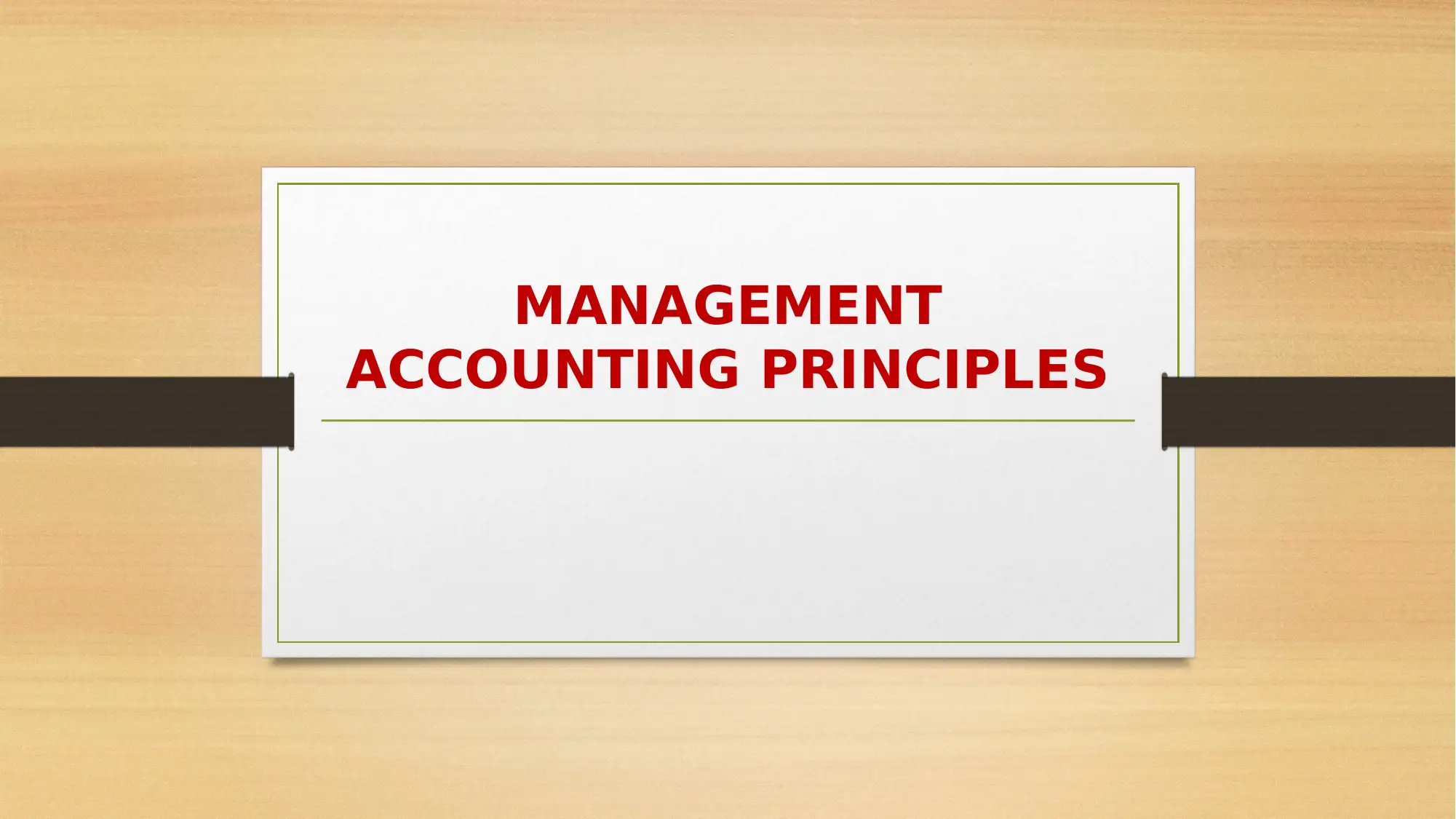
MANAGEMENT
ACCOUNTING PRINCIPLES
ACCOUNTING PRINCIPLES
Paraphrase This Document
Need a fresh take? Get an instant paraphrase of this document with our AI Paraphraser
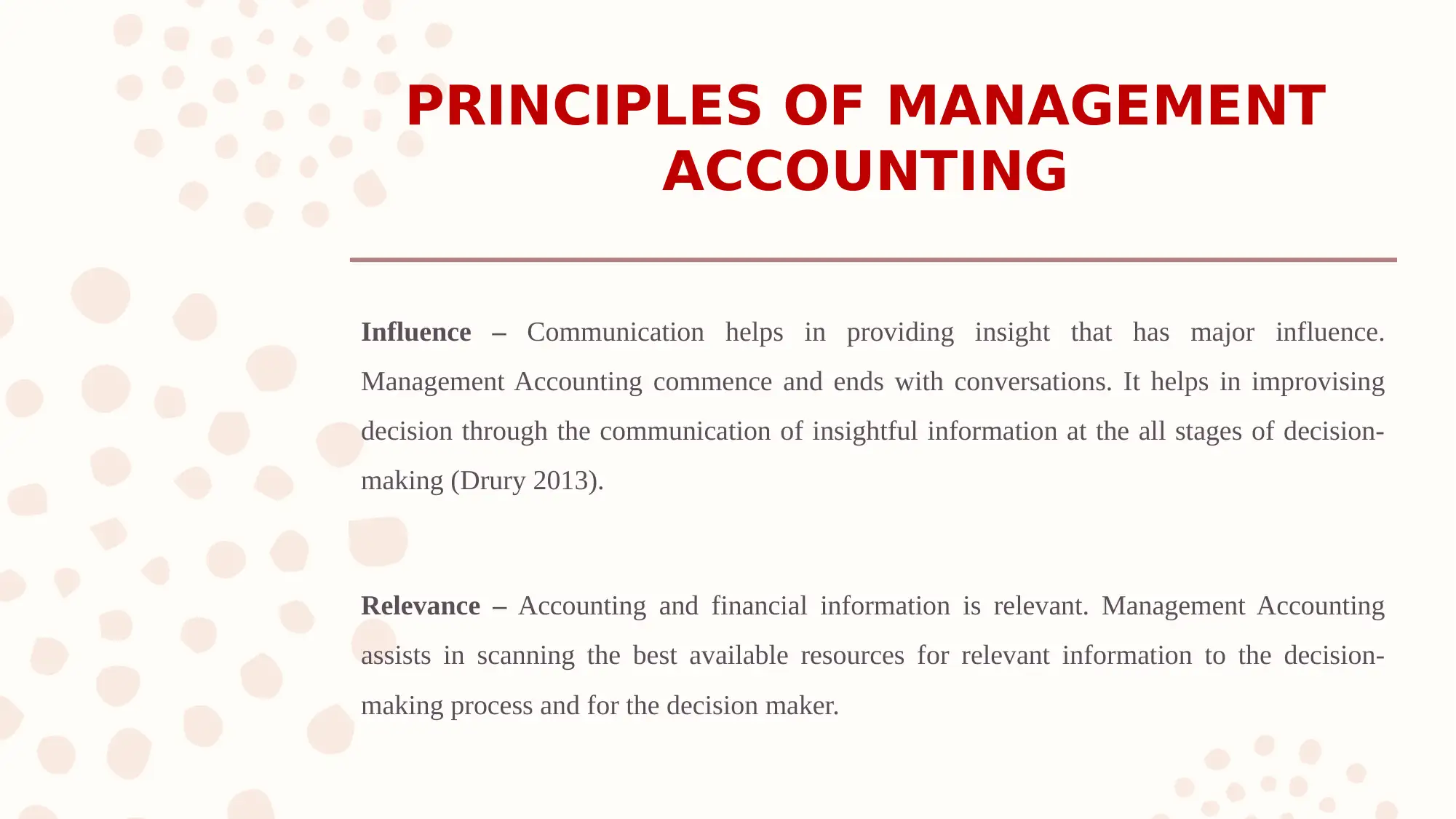
PRINCIPLES OF MANAGEMENT
ACCOUNTING
Influence – Communication helps in providing insight that has major influence.
Management Accounting commence and ends with conversations. It helps in improvising
decision through the communication of insightful information at the all stages of decision-
making (Drury 2013).
Relevance – Accounting and financial information is relevant. Management Accounting
assists in scanning the best available resources for relevant information to the decision-
making process and for the decision maker.
ACCOUNTING
Influence – Communication helps in providing insight that has major influence.
Management Accounting commence and ends with conversations. It helps in improvising
decision through the communication of insightful information at the all stages of decision-
making (Drury 2013).
Relevance – Accounting and financial information is relevant. Management Accounting
assists in scanning the best available resources for relevant information to the decision-
making process and for the decision maker.
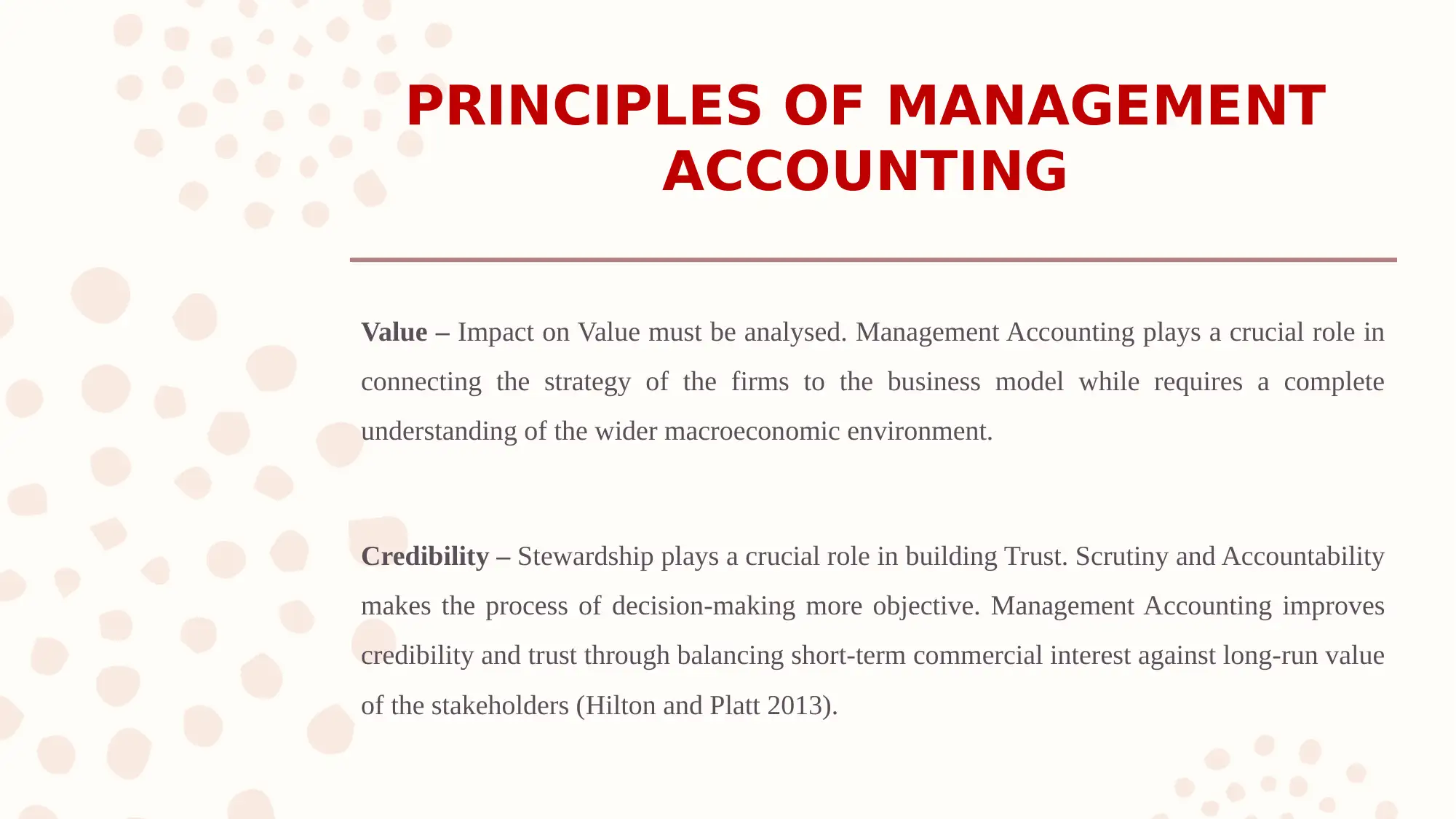
PRINCIPLES OF MANAGEMENT
ACCOUNTING
Value – Impact on Value must be analysed. Management Accounting plays a crucial role in
connecting the strategy of the firms to the business model while requires a complete
understanding of the wider macroeconomic environment.
Credibility – Stewardship plays a crucial role in building Trust. Scrutiny and Accountability
makes the process of decision-making more objective. Management Accounting improves
credibility and trust through balancing short-term commercial interest against long-run value
of the stakeholders (Hilton and Platt 2013).
ACCOUNTING
Value – Impact on Value must be analysed. Management Accounting plays a crucial role in
connecting the strategy of the firms to the business model while requires a complete
understanding of the wider macroeconomic environment.
Credibility – Stewardship plays a crucial role in building Trust. Scrutiny and Accountability
makes the process of decision-making more objective. Management Accounting improves
credibility and trust through balancing short-term commercial interest against long-run value
of the stakeholders (Hilton and Platt 2013).
⊘ This is a preview!⊘
Do you want full access?
Subscribe today to unlock all pages.

Trusted by 1+ million students worldwide
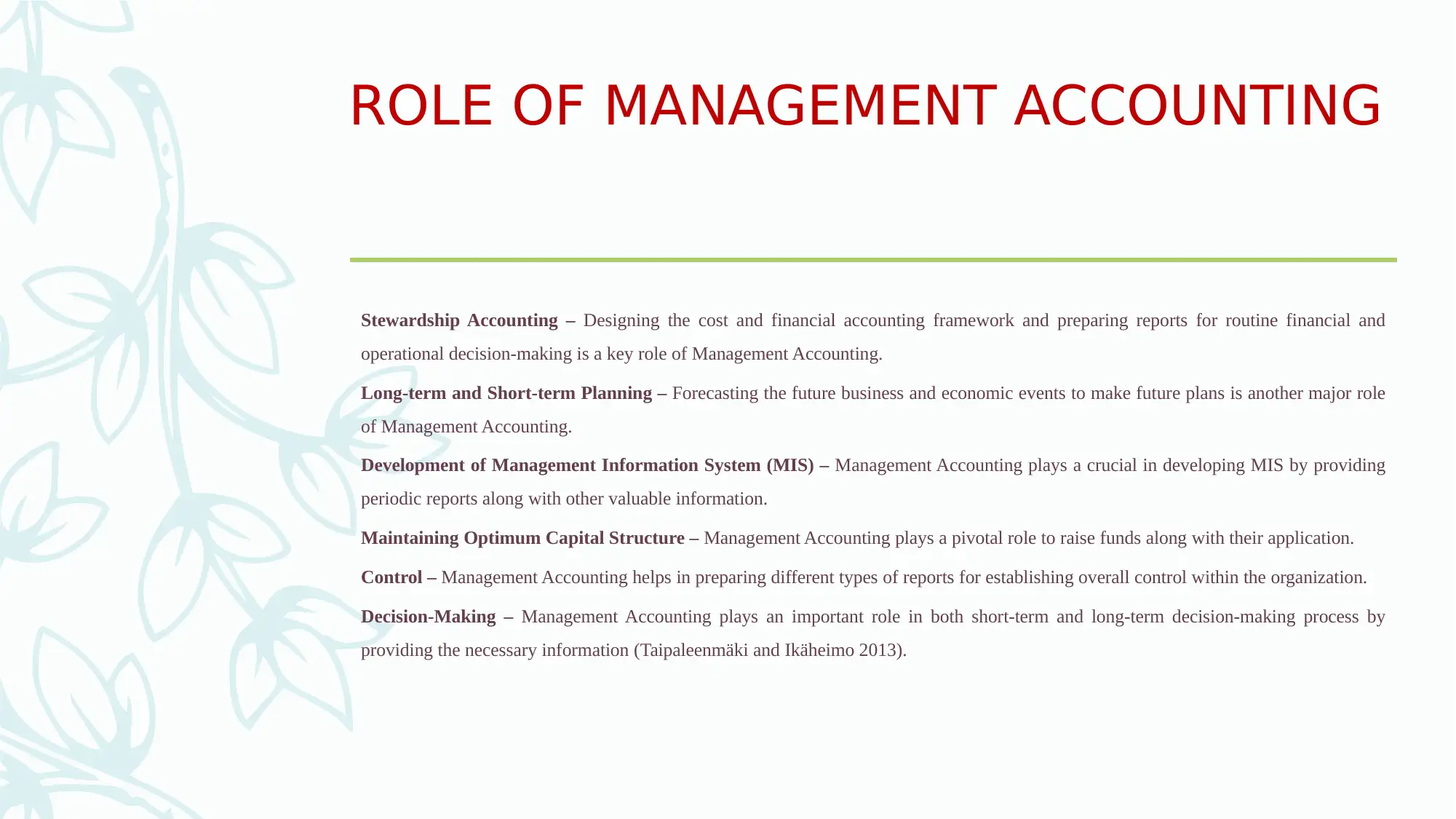
ROLE OF MANAGEMENT ACCOUNTING
Stewardship Accounting – Designing the cost and financial accounting framework and preparing reports for routine financial and
operational decision-making is a key role of Management Accounting.
Long-term and Short-term Planning – Forecasting the future business and economic events to make future plans is another major role
of Management Accounting.
Development of Management Information System (MIS) – Management Accounting plays a crucial in developing MIS by providing
periodic reports along with other valuable information.
Maintaining Optimum Capital Structure – Management Accounting plays a pivotal role to raise funds along with their application.
Control – Management Accounting helps in preparing different types of reports for establishing overall control within the organization.
Decision-Making – Management Accounting plays an important role in both short-term and long-term decision-making process by
providing the necessary information (Taipaleenmäki and Ikäheimo 2013).
Stewardship Accounting – Designing the cost and financial accounting framework and preparing reports for routine financial and
operational decision-making is a key role of Management Accounting.
Long-term and Short-term Planning – Forecasting the future business and economic events to make future plans is another major role
of Management Accounting.
Development of Management Information System (MIS) – Management Accounting plays a crucial in developing MIS by providing
periodic reports along with other valuable information.
Maintaining Optimum Capital Structure – Management Accounting plays a pivotal role to raise funds along with their application.
Control – Management Accounting helps in preparing different types of reports for establishing overall control within the organization.
Decision-Making – Management Accounting plays an important role in both short-term and long-term decision-making process by
providing the necessary information (Taipaleenmäki and Ikäheimo 2013).
Paraphrase This Document
Need a fresh take? Get an instant paraphrase of this document with our AI Paraphraser
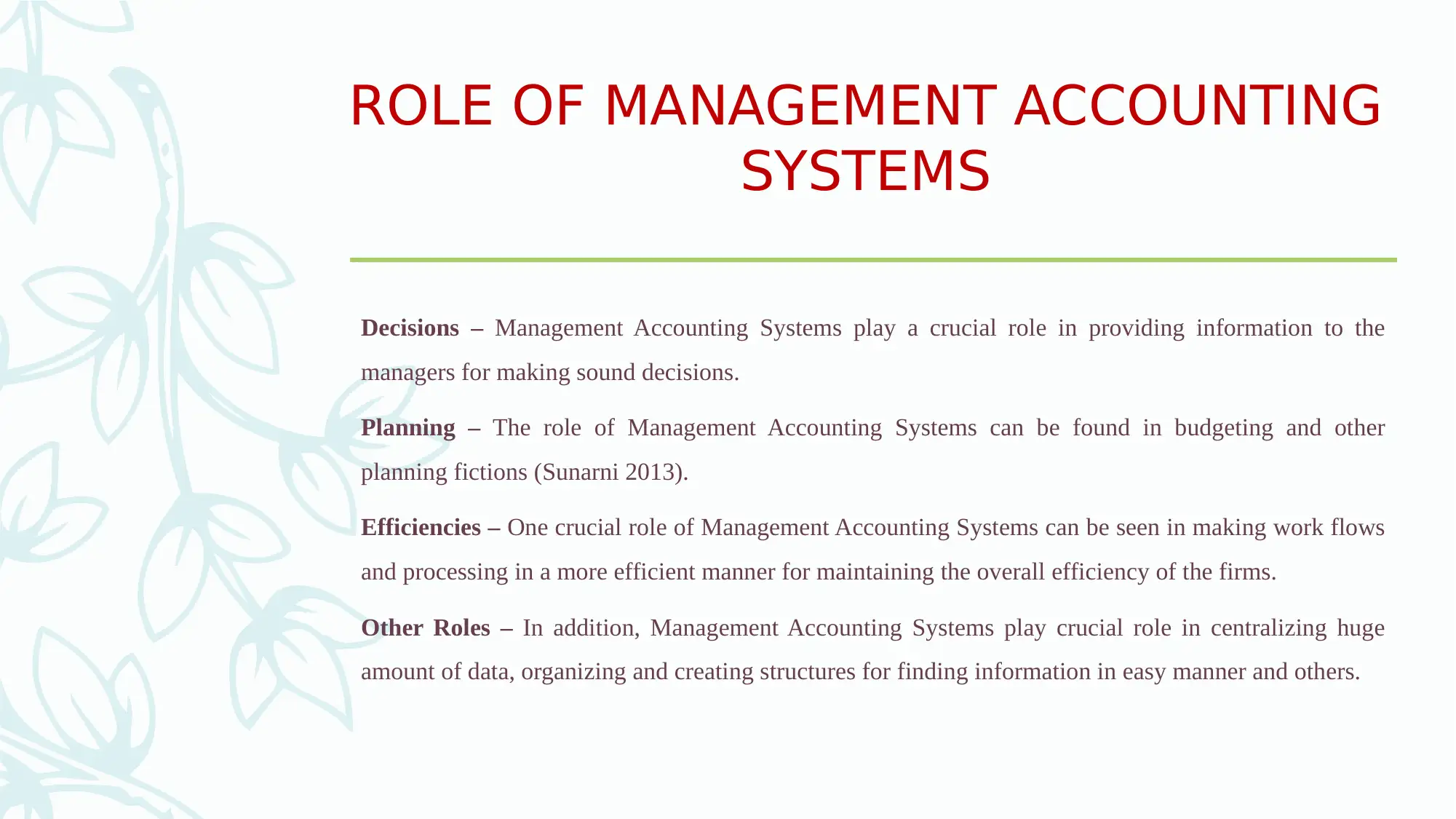
ROLE OF MANAGEMENT ACCOUNTING
SYSTEMS
Decisions – Management Accounting Systems play a crucial role in providing information to the
managers for making sound decisions.
Planning – The role of Management Accounting Systems can be found in budgeting and other
planning fictions (Sunarni 2013).
Efficiencies – One crucial role of Management Accounting Systems can be seen in making work flows
and processing in a more efficient manner for maintaining the overall efficiency of the firms.
Other Roles – In addition, Management Accounting Systems play crucial role in centralizing huge
amount of data, organizing and creating structures for finding information in easy manner and others.
SYSTEMS
Decisions – Management Accounting Systems play a crucial role in providing information to the
managers for making sound decisions.
Planning – The role of Management Accounting Systems can be found in budgeting and other
planning fictions (Sunarni 2013).
Efficiencies – One crucial role of Management Accounting Systems can be seen in making work flows
and processing in a more efficient manner for maintaining the overall efficiency of the firms.
Other Roles – In addition, Management Accounting Systems play crucial role in centralizing huge
amount of data, organizing and creating structures for finding information in easy manner and others.
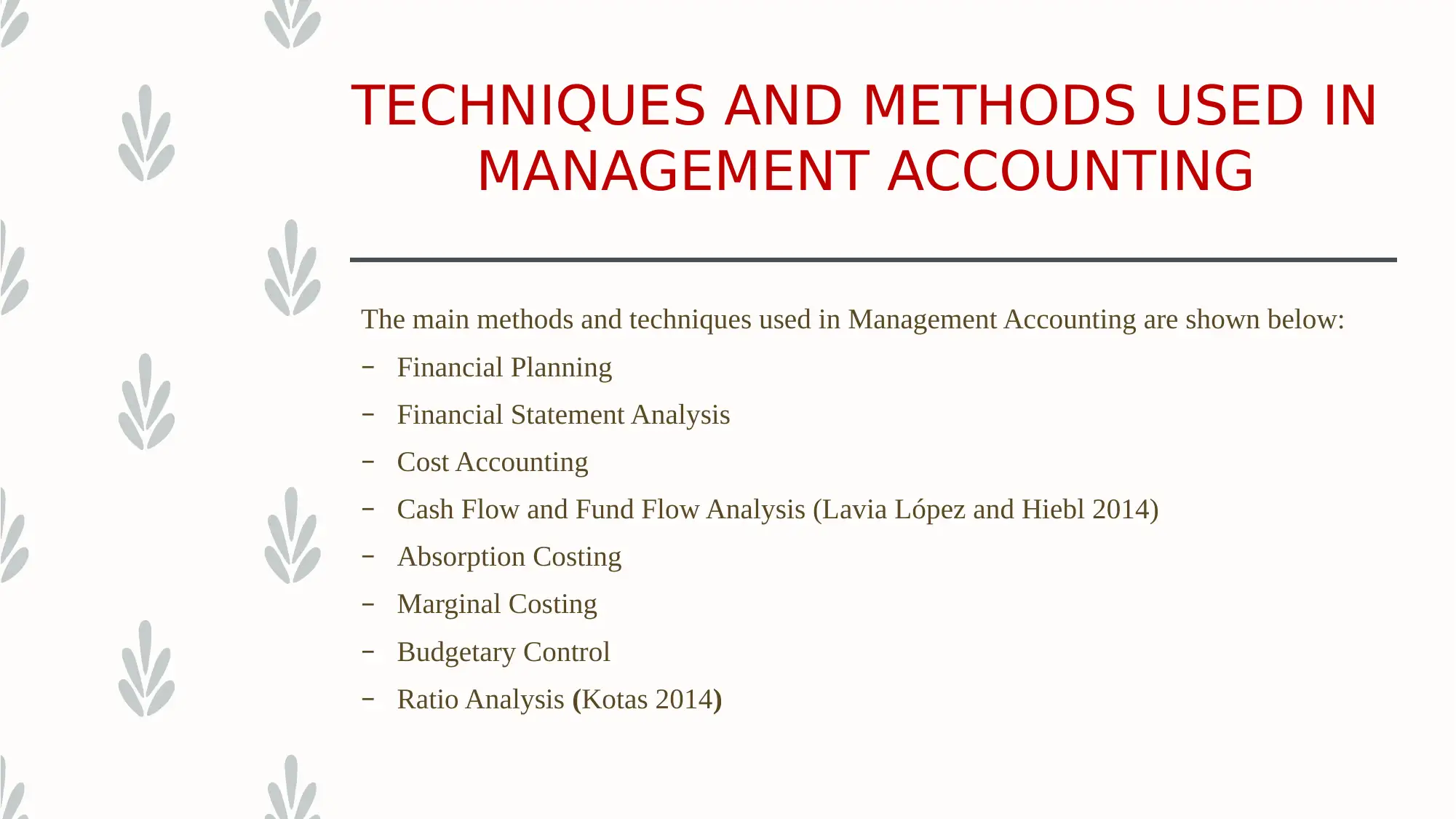
TECHNIQUES AND METHODS USED IN
MANAGEMENT ACCOUNTING
The main methods and techniques used in Management Accounting are shown below:
– Financial Planning
– Financial Statement Analysis
– Cost Accounting
– Cash Flow and Fund Flow Analysis (Lavia López and Hiebl 2014)
– Absorption Costing
– Marginal Costing
– Budgetary Control
– Ratio Analysis (Kotas 2014)
MANAGEMENT ACCOUNTING
The main methods and techniques used in Management Accounting are shown below:
– Financial Planning
– Financial Statement Analysis
– Cost Accounting
– Cash Flow and Fund Flow Analysis (Lavia López and Hiebl 2014)
– Absorption Costing
– Marginal Costing
– Budgetary Control
– Ratio Analysis (Kotas 2014)
⊘ This is a preview!⊘
Do you want full access?
Subscribe today to unlock all pages.

Trusted by 1+ million students worldwide
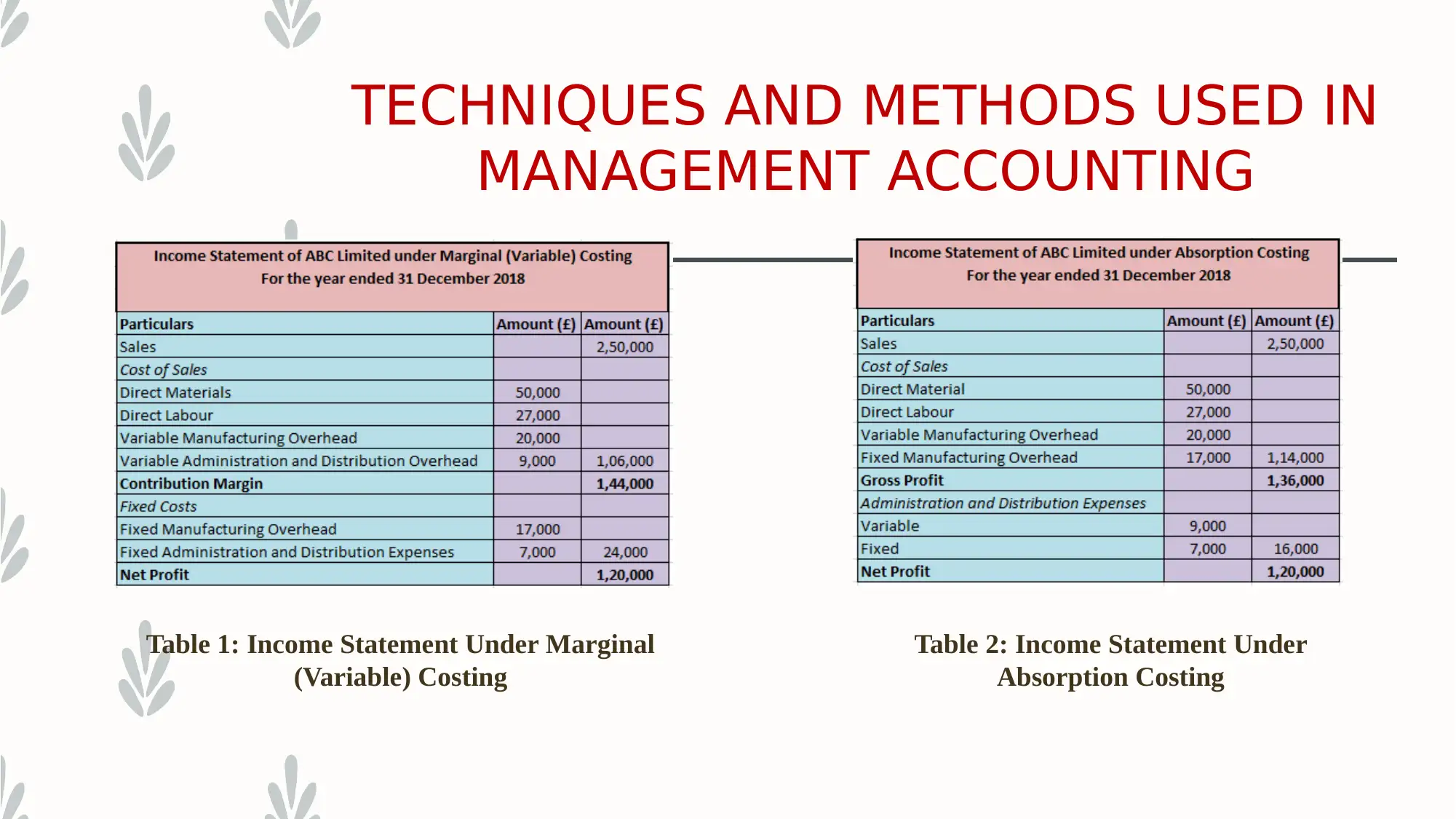
TECHNIQUES AND METHODS USED IN
MANAGEMENT ACCOUNTING
Table 1: Income Statement Under Marginal
(Variable) Costing
Table 2: Income Statement Under
Absorption Costing
MANAGEMENT ACCOUNTING
Table 1: Income Statement Under Marginal
(Variable) Costing
Table 2: Income Statement Under
Absorption Costing
Paraphrase This Document
Need a fresh take? Get an instant paraphrase of this document with our AI Paraphraser
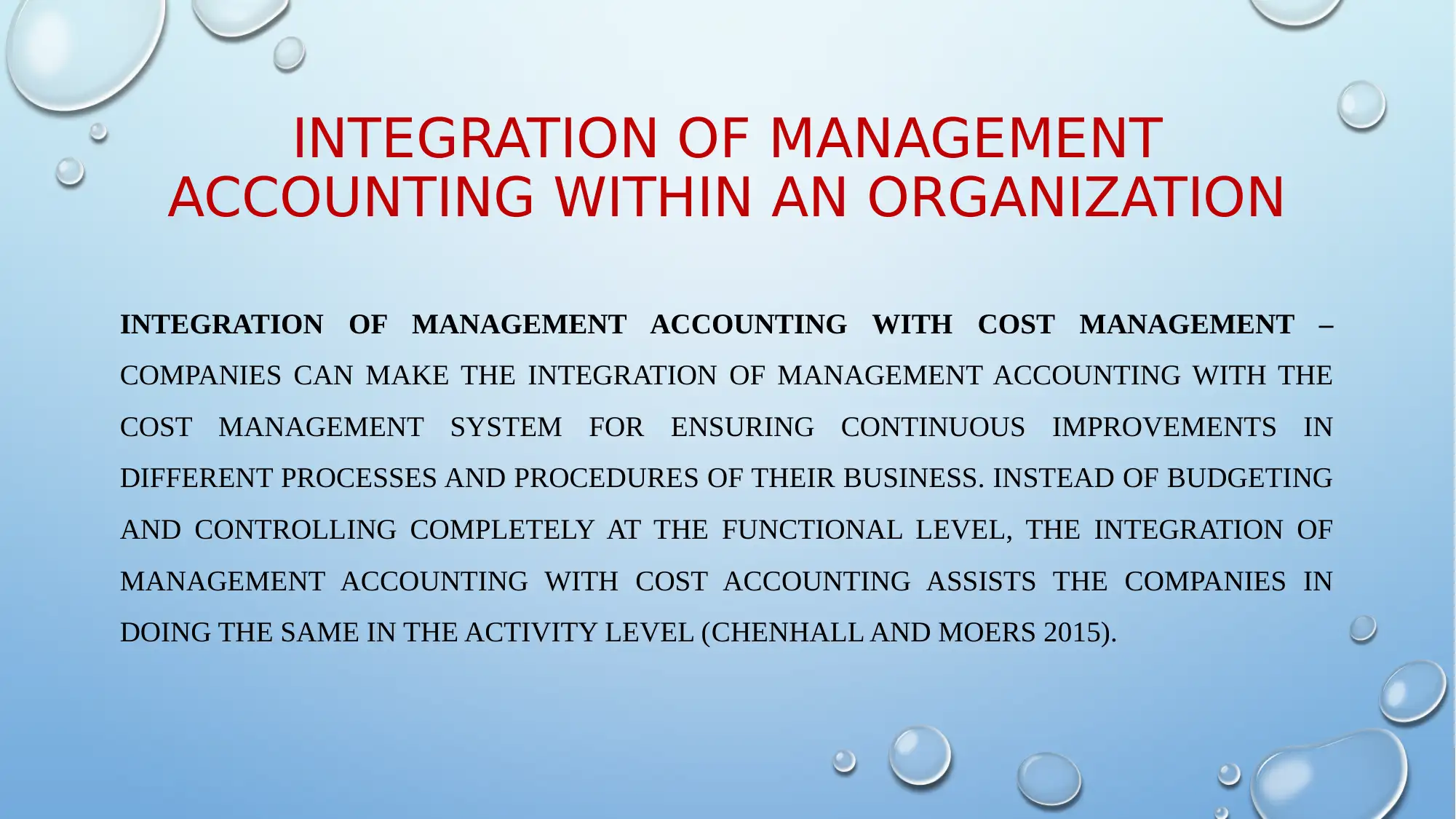
INTEGRATION OF MANAGEMENT
ACCOUNTING WITHIN AN ORGANIZATION
INTEGRATION OF MANAGEMENT ACCOUNTING WITH COST MANAGEMENT –
COMPANIES CAN MAKE THE INTEGRATION OF MANAGEMENT ACCOUNTING WITH THE
COST MANAGEMENT SYSTEM FOR ENSURING CONTINUOUS IMPROVEMENTS IN
DIFFERENT PROCESSES AND PROCEDURES OF THEIR BUSINESS. INSTEAD OF BUDGETING
AND CONTROLLING COMPLETELY AT THE FUNCTIONAL LEVEL, THE INTEGRATION OF
MANAGEMENT ACCOUNTING WITH COST ACCOUNTING ASSISTS THE COMPANIES IN
DOING THE SAME IN THE ACTIVITY LEVEL (CHENHALL AND MOERS 2015).
ACCOUNTING WITHIN AN ORGANIZATION
INTEGRATION OF MANAGEMENT ACCOUNTING WITH COST MANAGEMENT –
COMPANIES CAN MAKE THE INTEGRATION OF MANAGEMENT ACCOUNTING WITH THE
COST MANAGEMENT SYSTEM FOR ENSURING CONTINUOUS IMPROVEMENTS IN
DIFFERENT PROCESSES AND PROCEDURES OF THEIR BUSINESS. INSTEAD OF BUDGETING
AND CONTROLLING COMPLETELY AT THE FUNCTIONAL LEVEL, THE INTEGRATION OF
MANAGEMENT ACCOUNTING WITH COST ACCOUNTING ASSISTS THE COMPANIES IN
DOING THE SAME IN THE ACTIVITY LEVEL (CHENHALL AND MOERS 2015).
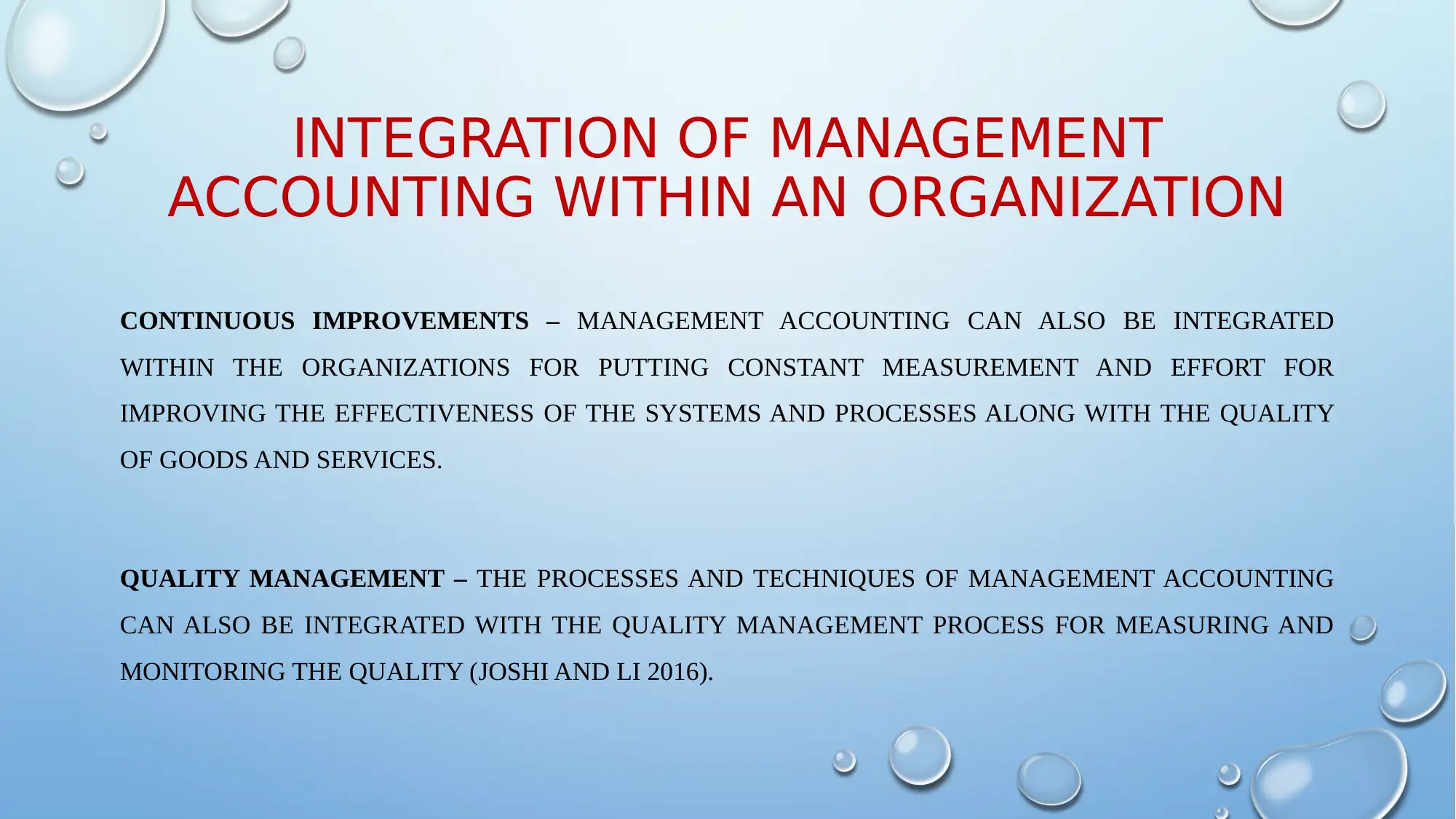
INTEGRATION OF MANAGEMENT
ACCOUNTING WITHIN AN ORGANIZATION
CONTINUOUS IMPROVEMENTS – MANAGEMENT ACCOUNTING CAN ALSO BE INTEGRATED
WITHIN THE ORGANIZATIONS FOR PUTTING CONSTANT MEASUREMENT AND EFFORT FOR
IMPROVING THE EFFECTIVENESS OF THE SYSTEMS AND PROCESSES ALONG WITH THE QUALITY
OF GOODS AND SERVICES.
QUALITY MANAGEMENT – THE PROCESSES AND TECHNIQUES OF MANAGEMENT ACCOUNTING
CAN ALSO BE INTEGRATED WITH THE QUALITY MANAGEMENT PROCESS FOR MEASURING AND
MONITORING THE QUALITY (JOSHI AND LI 2016).
ACCOUNTING WITHIN AN ORGANIZATION
CONTINUOUS IMPROVEMENTS – MANAGEMENT ACCOUNTING CAN ALSO BE INTEGRATED
WITHIN THE ORGANIZATIONS FOR PUTTING CONSTANT MEASUREMENT AND EFFORT FOR
IMPROVING THE EFFECTIVENESS OF THE SYSTEMS AND PROCESSES ALONG WITH THE QUALITY
OF GOODS AND SERVICES.
QUALITY MANAGEMENT – THE PROCESSES AND TECHNIQUES OF MANAGEMENT ACCOUNTING
CAN ALSO BE INTEGRATED WITH THE QUALITY MANAGEMENT PROCESS FOR MEASURING AND
MONITORING THE QUALITY (JOSHI AND LI 2016).
⊘ This is a preview!⊘
Do you want full access?
Subscribe today to unlock all pages.

Trusted by 1+ million students worldwide
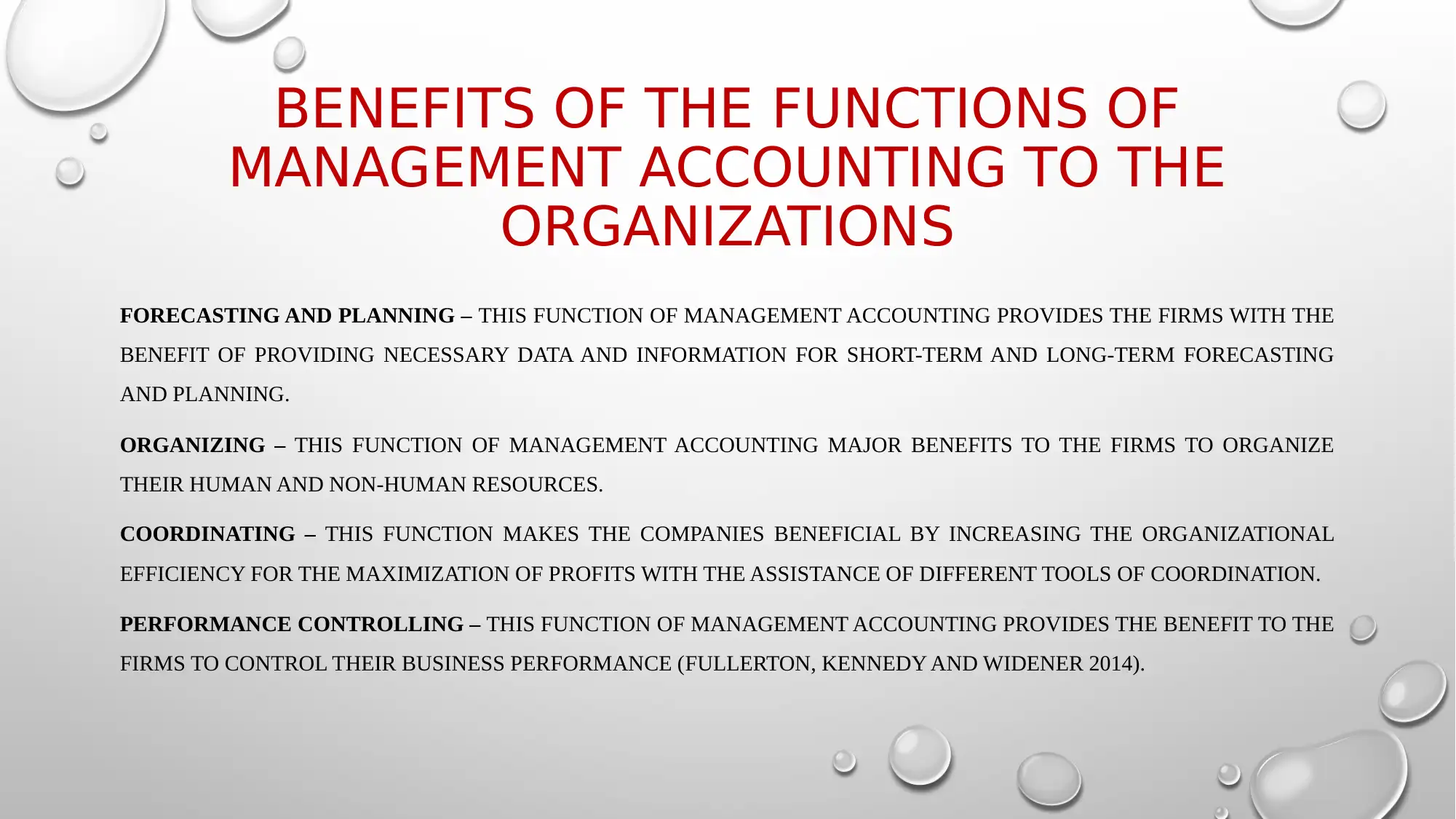
BENEFITS OF THE FUNCTIONS OF
MANAGEMENT ACCOUNTING TO THE
ORGANIZATIONS
FORECASTING AND PLANNING – THIS FUNCTION OF MANAGEMENT ACCOUNTING PROVIDES THE FIRMS WITH THE
BENEFIT OF PROVIDING NECESSARY DATA AND INFORMATION FOR SHORT-TERM AND LONG-TERM FORECASTING
AND PLANNING.
ORGANIZING – THIS FUNCTION OF MANAGEMENT ACCOUNTING MAJOR BENEFITS TO THE FIRMS TO ORGANIZE
THEIR HUMAN AND NON-HUMAN RESOURCES.
COORDINATING – THIS FUNCTION MAKES THE COMPANIES BENEFICIAL BY INCREASING THE ORGANIZATIONAL
EFFICIENCY FOR THE MAXIMIZATION OF PROFITS WITH THE ASSISTANCE OF DIFFERENT TOOLS OF COORDINATION.
PERFORMANCE CONTROLLING – THIS FUNCTION OF MANAGEMENT ACCOUNTING PROVIDES THE BENEFIT TO THE
FIRMS TO CONTROL THEIR BUSINESS PERFORMANCE (FULLERTON, KENNEDY AND WIDENER 2014).
MANAGEMENT ACCOUNTING TO THE
ORGANIZATIONS
FORECASTING AND PLANNING – THIS FUNCTION OF MANAGEMENT ACCOUNTING PROVIDES THE FIRMS WITH THE
BENEFIT OF PROVIDING NECESSARY DATA AND INFORMATION FOR SHORT-TERM AND LONG-TERM FORECASTING
AND PLANNING.
ORGANIZING – THIS FUNCTION OF MANAGEMENT ACCOUNTING MAJOR BENEFITS TO THE FIRMS TO ORGANIZE
THEIR HUMAN AND NON-HUMAN RESOURCES.
COORDINATING – THIS FUNCTION MAKES THE COMPANIES BENEFICIAL BY INCREASING THE ORGANIZATIONAL
EFFICIENCY FOR THE MAXIMIZATION OF PROFITS WITH THE ASSISTANCE OF DIFFERENT TOOLS OF COORDINATION.
PERFORMANCE CONTROLLING – THIS FUNCTION OF MANAGEMENT ACCOUNTING PROVIDES THE BENEFIT TO THE
FIRMS TO CONTROL THEIR BUSINESS PERFORMANCE (FULLERTON, KENNEDY AND WIDENER 2014).
Paraphrase This Document
Need a fresh take? Get an instant paraphrase of this document with our AI Paraphraser
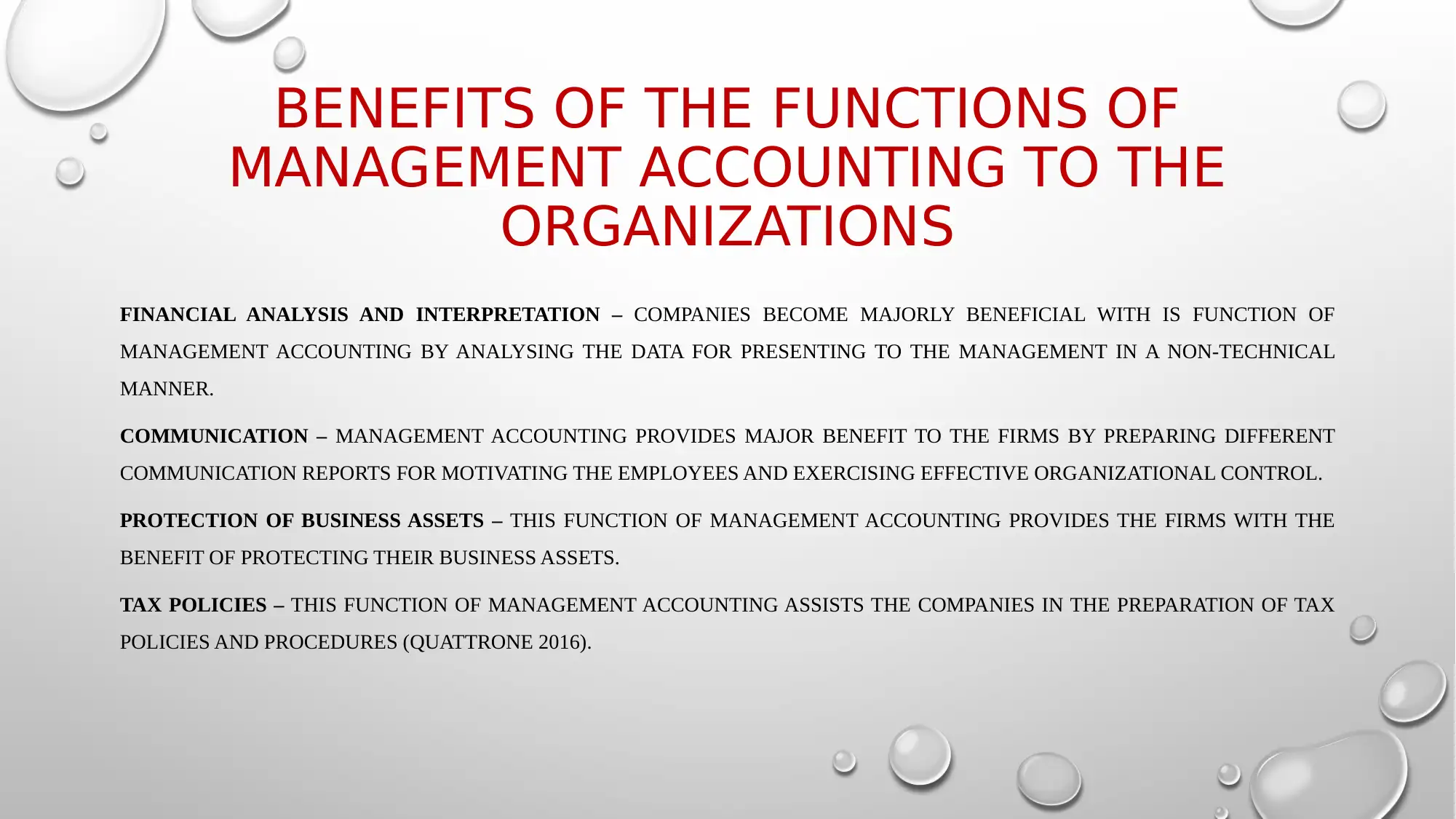
BENEFITS OF THE FUNCTIONS OF
MANAGEMENT ACCOUNTING TO THE
ORGANIZATIONS
FINANCIAL ANALYSIS AND INTERPRETATION – COMPANIES BECOME MAJORLY BENEFICIAL WITH IS FUNCTION OF
MANAGEMENT ACCOUNTING BY ANALYSING THE DATA FOR PRESENTING TO THE MANAGEMENT IN A NON-TECHNICAL
MANNER.
COMMUNICATION – MANAGEMENT ACCOUNTING PROVIDES MAJOR BENEFIT TO THE FIRMS BY PREPARING DIFFERENT
COMMUNICATION REPORTS FOR MOTIVATING THE EMPLOYEES AND EXERCISING EFFECTIVE ORGANIZATIONAL CONTROL.
PROTECTION OF BUSINESS ASSETS – THIS FUNCTION OF MANAGEMENT ACCOUNTING PROVIDES THE FIRMS WITH THE
BENEFIT OF PROTECTING THEIR BUSINESS ASSETS.
TAX POLICIES – THIS FUNCTION OF MANAGEMENT ACCOUNTING ASSISTS THE COMPANIES IN THE PREPARATION OF TAX
POLICIES AND PROCEDURES (QUATTRONE 2016).
MANAGEMENT ACCOUNTING TO THE
ORGANIZATIONS
FINANCIAL ANALYSIS AND INTERPRETATION – COMPANIES BECOME MAJORLY BENEFICIAL WITH IS FUNCTION OF
MANAGEMENT ACCOUNTING BY ANALYSING THE DATA FOR PRESENTING TO THE MANAGEMENT IN A NON-TECHNICAL
MANNER.
COMMUNICATION – MANAGEMENT ACCOUNTING PROVIDES MAJOR BENEFIT TO THE FIRMS BY PREPARING DIFFERENT
COMMUNICATION REPORTS FOR MOTIVATING THE EMPLOYEES AND EXERCISING EFFECTIVE ORGANIZATIONAL CONTROL.
PROTECTION OF BUSINESS ASSETS – THIS FUNCTION OF MANAGEMENT ACCOUNTING PROVIDES THE FIRMS WITH THE
BENEFIT OF PROTECTING THEIR BUSINESS ASSETS.
TAX POLICIES – THIS FUNCTION OF MANAGEMENT ACCOUNTING ASSISTS THE COMPANIES IN THE PREPARATION OF TAX
POLICIES AND PROCEDURES (QUATTRONE 2016).
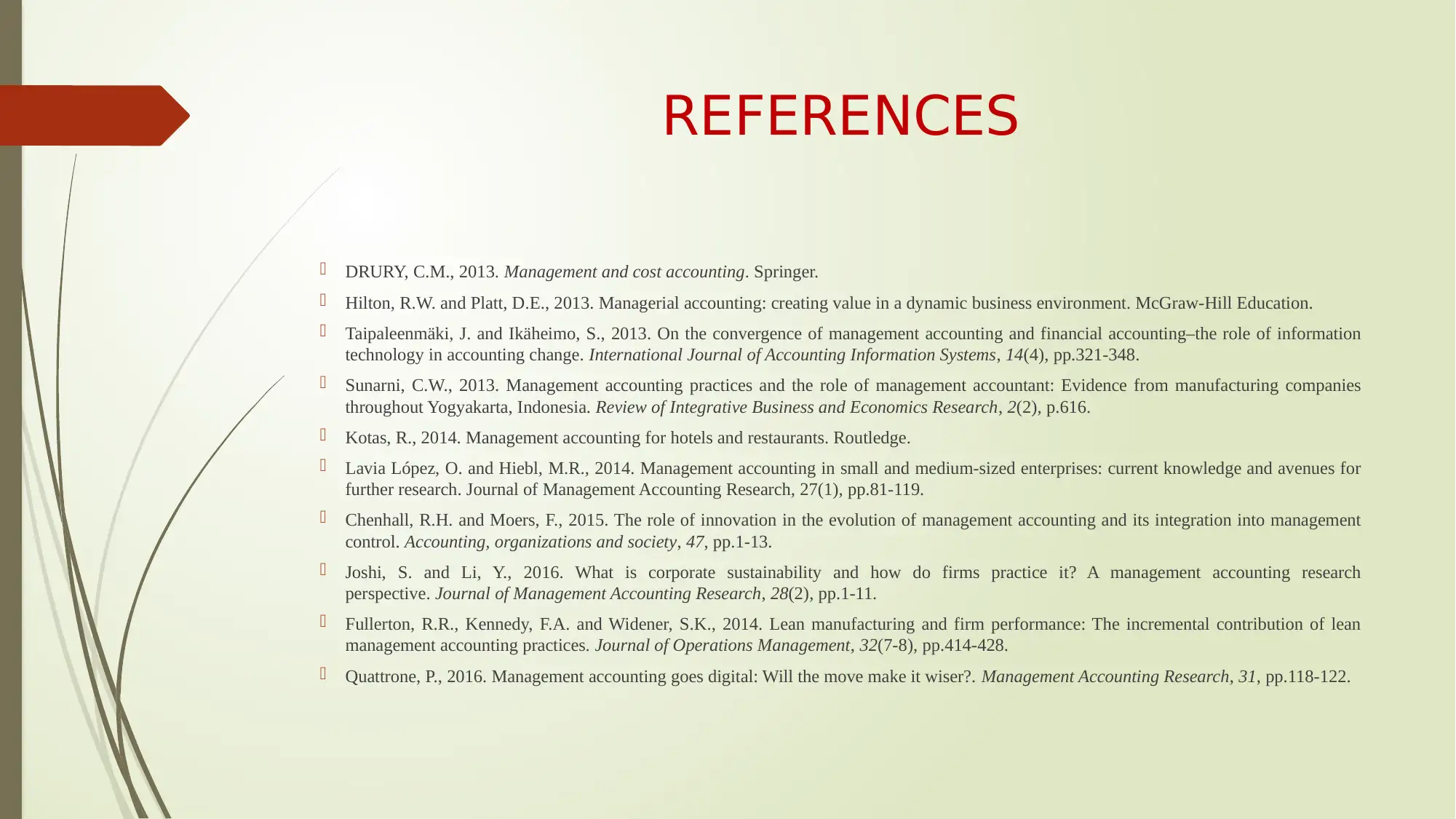
REFERENCES
DRURY, C.M., 2013. Management and cost accounting. Springer.
Hilton, R.W. and Platt, D.E., 2013. Managerial accounting: creating value in a dynamic business environment. McGraw-Hill Education.
Taipaleenmäki, J. and Ikäheimo, S., 2013. On the convergence of management accounting and financial accounting–the role of information
technology in accounting change. International Journal of Accounting Information Systems, 14(4), pp.321-348.
Sunarni, C.W., 2013. Management accounting practices and the role of management accountant: Evidence from manufacturing companies
throughout Yogyakarta, Indonesia. Review of Integrative Business and Economics Research, 2(2), p.616.
Kotas, R., 2014. Management accounting for hotels and restaurants. Routledge.
Lavia López, O. and Hiebl, M.R., 2014. Management accounting in small and medium-sized enterprises: current knowledge and avenues for
further research. Journal of Management Accounting Research, 27(1), pp.81-119.
Chenhall, R.H. and Moers, F., 2015. The role of innovation in the evolution of management accounting and its integration into management
control. Accounting, organizations and society, 47, pp.1-13.
Joshi, S. and Li, Y., 2016. What is corporate sustainability and how do firms practice it? A management accounting research
perspective. Journal of Management Accounting Research, 28(2), pp.1-11.
Fullerton, R.R., Kennedy, F.A. and Widener, S.K., 2014. Lean manufacturing and firm performance: The incremental contribution of lean
management accounting practices. Journal of Operations Management, 32(7-8), pp.414-428.
Quattrone, P., 2016. Management accounting goes digital: Will the move make it wiser?. Management Accounting Research, 31, pp.118-122.
DRURY, C.M., 2013. Management and cost accounting. Springer.
Hilton, R.W. and Platt, D.E., 2013. Managerial accounting: creating value in a dynamic business environment. McGraw-Hill Education.
Taipaleenmäki, J. and Ikäheimo, S., 2013. On the convergence of management accounting and financial accounting–the role of information
technology in accounting change. International Journal of Accounting Information Systems, 14(4), pp.321-348.
Sunarni, C.W., 2013. Management accounting practices and the role of management accountant: Evidence from manufacturing companies
throughout Yogyakarta, Indonesia. Review of Integrative Business and Economics Research, 2(2), p.616.
Kotas, R., 2014. Management accounting for hotels and restaurants. Routledge.
Lavia López, O. and Hiebl, M.R., 2014. Management accounting in small and medium-sized enterprises: current knowledge and avenues for
further research. Journal of Management Accounting Research, 27(1), pp.81-119.
Chenhall, R.H. and Moers, F., 2015. The role of innovation in the evolution of management accounting and its integration into management
control. Accounting, organizations and society, 47, pp.1-13.
Joshi, S. and Li, Y., 2016. What is corporate sustainability and how do firms practice it? A management accounting research
perspective. Journal of Management Accounting Research, 28(2), pp.1-11.
Fullerton, R.R., Kennedy, F.A. and Widener, S.K., 2014. Lean manufacturing and firm performance: The incremental contribution of lean
management accounting practices. Journal of Operations Management, 32(7-8), pp.414-428.
Quattrone, P., 2016. Management accounting goes digital: Will the move make it wiser?. Management Accounting Research, 31, pp.118-122.
⊘ This is a preview!⊘
Do you want full access?
Subscribe today to unlock all pages.

Trusted by 1+ million students worldwide
1 out of 13
Related Documents
Your All-in-One AI-Powered Toolkit for Academic Success.
+13062052269
info@desklib.com
Available 24*7 on WhatsApp / Email
![[object Object]](/_next/static/media/star-bottom.7253800d.svg)
Unlock your academic potential
Copyright © 2020–2025 A2Z Services. All Rights Reserved. Developed and managed by ZUCOL.





